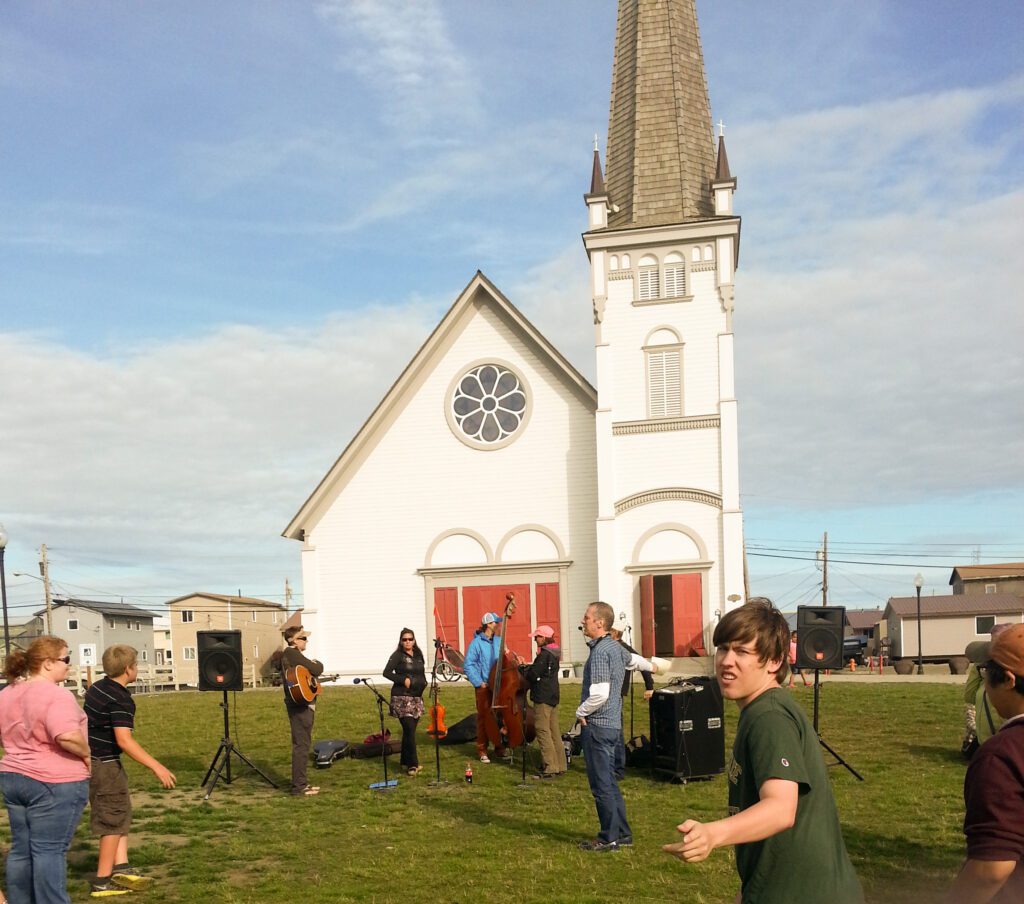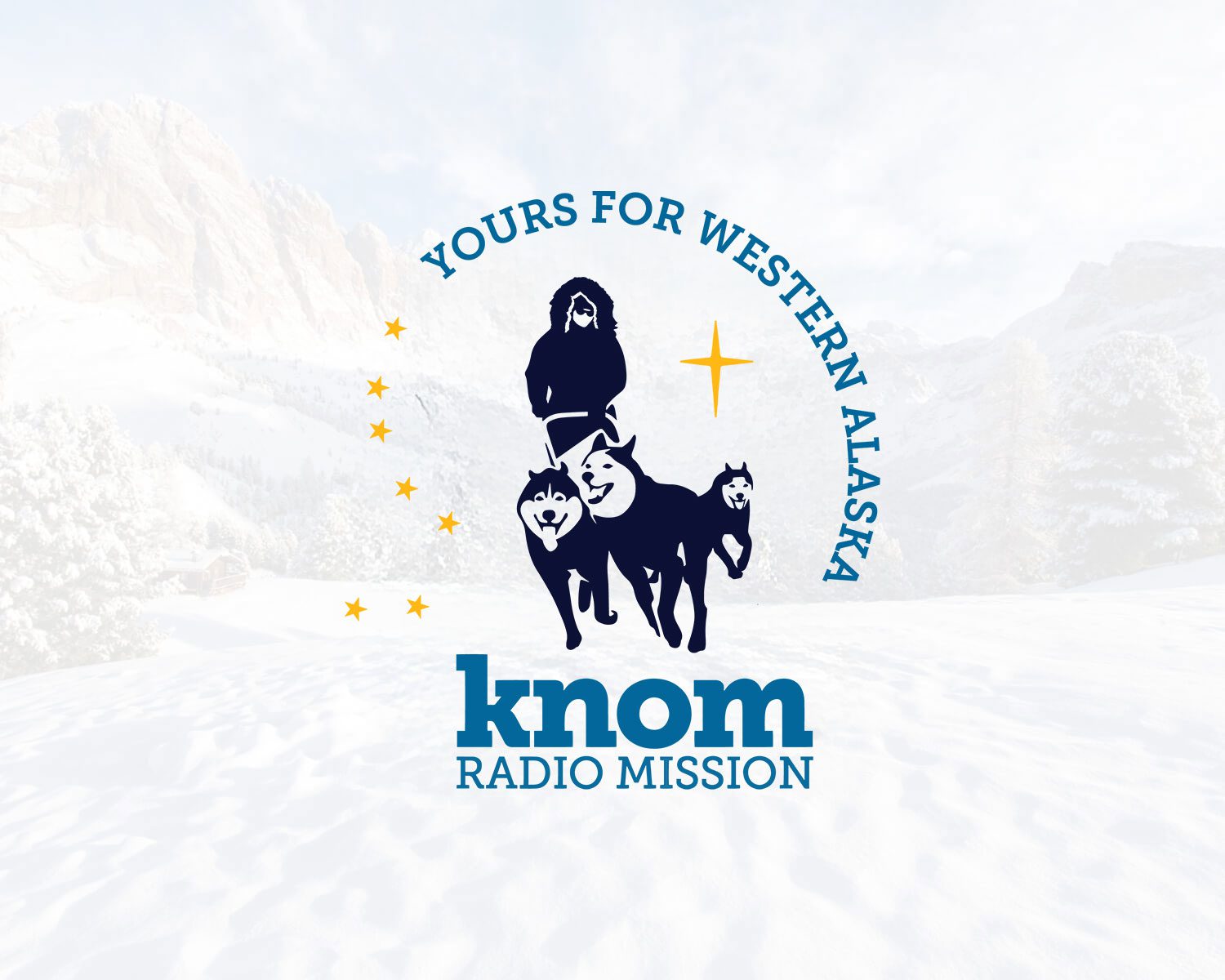Last week was the Week of Prayer for Christian Unity, when Christians from all denominations agree to put aside their differences and recognize that we worship the same God. It’s a step that I appreciate personally, as God is big enough to encompass different ways of living and practicing faith. So when the Nome Ministerial Association decided that they wanted to mark this year’s Week of Prayer for Christian Unity with worship services hosted by different churches, but led by a mixture of Christian Leaders, I was excited to be asked to help lead each service.

Lucus Keppel, Linda Scott, Karen Sonray, Julie Yoder Elmore, Ross Tozzi, Bob Froehle, and Sister Nirmala
Photo courtesy of Julie Yoder Elmore
Officially, I am the liaison to the Nome Ministerial Association from KNOM Radio Mission Inc, invited to be a member by virtue of KNOM being a Christian organization – but I am also a Seminary graduate, and have missed leading worship services on a regular basis. In my last year at Seminary, I was a chapel coordinator, helping to design and lead worship three times a week, and sometimes an additional time at my church. It felt like going from 70 to zero when coming to Nome, and so this was a chance to get involved in worship leadership again. I didn’t get to plan the services, since the planning was the responsibility of the Christian leaders whose churches were hosting the worship services, but I did get to participate in the service more directly than I have in months.
And it felt great to be a part of the ecumenical leadership! (Ecumenical is a fancy word that literally means “of the inhabited world”, ie, Christendom, but is usually used to mean inter-denominational). I really appreciate the ability to work with leaders of the varied congregations in Nome – whether Fr. Ross of St. Joseph’s Catholic Church, Pastor Julie of Community United Methodist Church, or Pastor Karen of Our Savior’s Lutheran Church, there was a sense of unity of purpose and intentionality of working together that spoke volumes on the state of Christianity today. The denominations that Julie, Karen, and I are part of have entered into agreements with each other to allow our pastors to serve at each others churches, and are considered to be in “full communion,” but only 50 years ago would have been at each other’s throats for our doctrinal differences. And the fact that the Catholic church is now working with the Protestant denominations is even more exciting. That same 50 years ago, the only unity the Protestants might have expressed was in their dislike of the Catholics. But now, things are changing.
This past monday, for instance, the Catholic church and the Reformed (Protestant) churches signed an agreement in Austin, Texas to recognize, officially, each other’s baptisms as legitimate. Unofficially, the baptisms of Catholics were recognized in Reformed churches, but the reciprocity was not always there. The signing of this agreement marks an official recognition of the validity of the Sacrament of Baptism on both sides, and is truly a historical moment. While this particular agreement holds only for American churches, similar agreements have been signed in Germany and Australia, and more are expected to follow over time.
But let’s get back to Nome: The Week of Prayer for Christian Unity is an outgrowth of a Catholic outreach, and this is the first time it has been recognized in Nome by the various churches. At each of the three services, people from all of the Nome churches were present, and most stayed afterwards for food and fellowship with each other. This fellowship time allowed for new connections to be made, and wonderful moments of awkwardness followed by forgiveness and understanding. The spirit of unity crossed over to radio as well, as both KNOM and KICY broadcast services during the week, and representatives from both stations were involved in the leadership. Finally, I was asked by the Nome Ministerial Association to write a short article for the Say it Sincerely column in the Nome Nugget newspaper, adding in yet another media outlet.
I can’t imagine a more successful Week of Prayer for Christian Unity, and it warms my heart that so many people of different backgrounds are willing to work together towards finding common purpose. I’m encouraged, and inspired to find a way to do a similar effort on an inter-faith level, working with the Abrahamic faiths (Judaism, Christianity, Islam) and beyond. Who knows what the future of this cooperation will bring? I am hopeful that, at the very least, we will be able to speak with each other genuinely, and continue this process of healing and love for many years.







